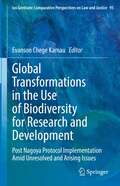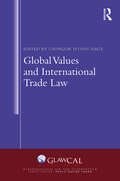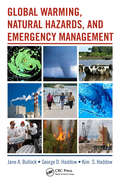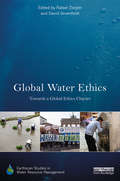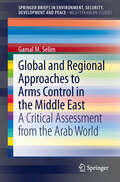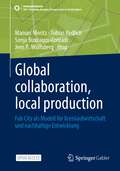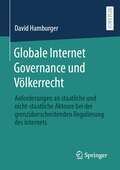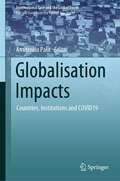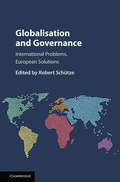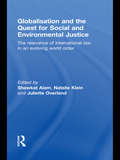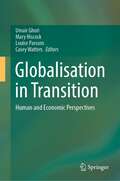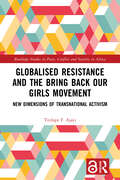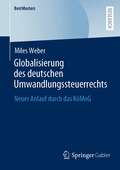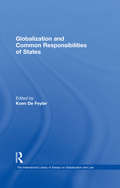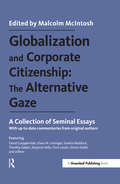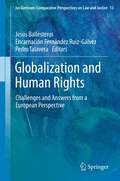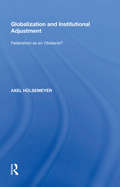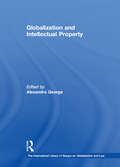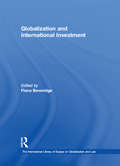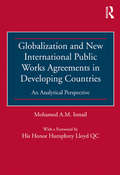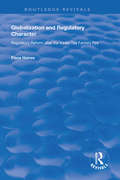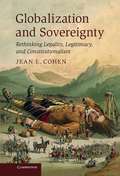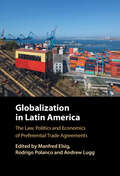- Table View
- List View
Global Transformations in the Use of Biodiversity for Research and Development: Post Nagoya Protocol Implementation Amid Unresolved and Arising Issues (Ius Gentium: Comparative Perspectives on Law and Justice #95)
by Evanson Chege KamauEnough laws have been enacted since the adoption of the Nagoya Protocol on access and benefit-sharing to permit a study which is capable of accurately portraying the status quo of national implementation of the Protocol and the ensuing practice, emerging challenges and how countries are coping with them. This book, one of the first to present such a study, uniquely combines an examination of the new laws and practice and how they comply with the Nagoya Protocol; of issues not yet resolved by the Protocol and which solutions are being explored; and of how research and development is responding to the new situation. In addition, it proposes solutions to selected questions on ABS based on real-world and hypothetical cases, which could instigate litigation.Written by a team of expert academics and practitioners in the field, this book makes a valuable contribution to academic and policy debates and to academic literature on international environmental law, international biodiversity law, international property law, climate law and the law of indigenous populations. It also offers a reference guide for practicing lawyers in the area of ABS.
Global Values and International Trade Law (Transnational Law and Governance)
by Csongor István NagyExploring the relationship and interaction between economic interests and normative non-trade values, this book argues that the emergence and development of non-trade values is based on a complex dialectic interaction between selfish economic interests and normative values, and examines how their structural interdependence has given rise to a remarkable evolution in international trade. Conceiving this relationship as an intricate dialectic one that is neither purely value-driven, nor purely economic-interest-driven, it addresses the emergence, function, and role of non-trade values in international trade with a synthetizing approach and explores the results of their interaction in international economic intercourse. Approaching the non-trade issues of trade in a holistic manner, the book demonstrates that trade can operate smoothly only if it is framed by an architecture of normative value standards and international trade liberalization has reached the level where further development calls for cooperation also in fields that, at first glance, may appear to be non-trade in nature.
Global Viewpoints: Civil Liberties
by Noel MerinoThis series provides readers with the information they need to think critically about the worldwide implications of global issues; each volume focuses on a controversial topic of worldwide importance and offers a panoramic view of opinions. This title explores free speech and freedom of expression, media freedom and freedom of the press, the right to due process, and the right to privacy; By illuminating the complexities and interrelations of the global community, this excellent resource helps students and other researchers enhance their global awareness.
Global Warming, Natural Hazards, and Emergency Management
by Jane A. Bullock George D. Haddow Kim S. HaddowScientists predict the earth is facing 40-to-60 years of climate change, even if emissions of carbon dioxide and other global warming gases stopped today. One inevitable consequence of the greenhouse gases already in the atmosphere will be an increase in the frequency and severity of natural disaster events. Global Warming, Natural Hazards, and Eme
Global Water Ethics: Towards a global ethics charter (Earthscan Studies in Water Resource Management)
by David Groenfeldt Rafael ZieglerScholarly interest in water ethics is increasing, motivated by the urgency of climate change, water scarcity, privatization and conflicts over water resources. Water ethics can provide both conceptual perspectives and practical methodologies for identifying outcomes which are environmentally sustainable and socially just. This book assesses the implications of ongoing research in framing a new discipline of water ethics in practice. Contributions consider the difficult ethical and epistemological questions of water ethics in a global context, as well as offering local, empirical perspectives. Case study chapters focus on a range of countries including Canada, China, Germany, India, South Africa and the USA. The respective insights are brought together in the final section concerning the practical project of a universal water ethics charter, alongside theoretical questions about the legitimacy of a global water ethics. Overall the book provides a stimulating examination of water ethics in theory and practice, relevant to academics and professionals in the fields of water resource management and governance, environmental ethics, geography, law and political science.
Global and Regional Approaches to Arms Control in the Middle East: A Critical Assessment from the Arab World
by Gamal M. SelimSince the end of the Cold War, the Middle East has been the focus of various projects for the establishment of arms control (including CBMs) regimes. Whereas some of these projects were initiated at the global level, others were discussed and debated at the regional level. This book analyses the global and regional dynamics of arms control in the Middle East in the post-Cold War era. It examines American and European arms control projects, the contexts in which they were presented, the reactions of major regional actors, and their impacts on arms control efforts in the region. It assesses Arab perceptions of the motivations for and constraints on establishing arms control regimes. It also explores the prospects of regional arms control in the context of the ongoing Arab Spring with its ramifications for Arab regional politics, and provides a new perspective on arms control in the Middle East. This volume enriches the ongoing discourse, which to date has been dominated by mainly Western perspectives.
Global collaboration, local production: Fab City als Modell für Kreislaufwirtschaft und nachhaltige Entwicklung (SDG - Forschung, Konzepte, Lösungsansätze zur Nachhaltigkeit)
by Jens P. Wulfsberg Tobias Redlich Manuel Moritz Sonja Buxbaum-ConradiDieses Open-Access-Buch gibt aktuelle interdisziplinäre Forschungseinblicke rund um das Fab City-Konzept. Ein Ansatz, der beschreibt, wie Produktions- und Konsumptionsweisen gestaltet werden können, sodass einerseits globale Kollaboration in und durch Communities von der Ideengenerierung bis zur Produktentwicklung physischer Güter mittels quelloffener Technologien (Open Source Software und Hardware) ermöglicht wird und andererseits die Produktion dieser Güter lokal und somit möglichst nahe am Ort des Bedarfs sowie dezentral im Sinne einer verteilten Produktion erfolgen kann, beispielsweise in Fab(rication) Labs. Ziel ist die Schaffung einer möglichst nachhaltigen Produktion bzw. Wertschöpfung. Ökologisch nachhaltig, indem lange Transportwege vermieden und auf Grundlage von Kreislaufprinzipien lokale Stoffkreisläufe geschlossen werden. Ökonomisch nachhaltig, indem durch quelloffene Technologien Wettbewerbsbeschränkungen und durch föderierte Ansätze Abhängigkeiten vermieden werden. Sozial nachhaltig durch ein partizipatives Wertschöpfungssystem, in dem der Zugang zu Wissen und Knowhow sowie zu Produktionsmitteln unbeschränkt ist. Über den gesamten Produktentstehungsprozess und -lebenszyklus enthält das vorliegende, bilinguale Werk in deutscher und englischer Sprache Beiträge aus den Bereichen Citizen & Collaborative Innovation and Design, Circular Design & Economy, Open-Source-Software-Tools für die Entwicklung von Open Source Hardware, Digital Product Passport, föderierte (Open-Source-) Systeme, die Verbreitung von Open Source Hardware sowie technical literacy und economic governance.Prof. Neil Gershenfeld, Director of MIT’s Center for Bits and Atoms, and Chairman of the board of The Fab Foundation:“For many years the growth of cities has been an inexorable trend, with cities acting as regional magnets and engines;the resources enabling a Fab City can also help expand opportunity beyond cities. There is now an opportunity and need for labs that can develop, deploy, and measure the frontiers of Fab City technologies. This book provides a much-needed snapshot of the current state of that challenge.”Tomas Diez, Executive Director of the Fab City Foundation: “This book is an invitation for large-scale collaboration to build distributed system that can support the development of alternative modes of production, in line with the social and ecological needs of our time.”
Globale Internet Governance und Völkerrecht: Anforderungen an staatliche und nicht-staatliche Akteure bei der grenzüberschreitenden Regulierung des Internets
by David HamburgerDie Regulierung des Internets, häufig auch als Internet Governance bezeichnet, erfolgt gegenwärtig durch eine Vielzahl sowohl privater als auch staatlicher Akteure. Zugleich ist es eine der drängendsten Herausforderungen mit Blick auf die Zukunft des Internets, den ständigen Prozess des Wandels und der Fortentwicklung dieses Mediums regulatorisch zu begleiten und einzuhegen. Dies wirft die Frage auf, welchen Regelungen und Vorschriften Regulierungsmaßnahmen unterliegen, die auf das Internet abzielen. Da aufgrund der entgrenzten Natur des Internets einer Regulierungsmaßnahme praktisch stets eine grenzüberschreitende und damit internationale Dimension zukommt, lässt sich dies jedoch nicht allein anhand nationaler Rechtsvorschriften beantworten. Stattdessen ist hierfür ein Rückgriff auf das Völkerrecht angezeigt. Der Band soll einen Beitrag dazu leisten, die Bedeutung des Völkerrechts für die globale Internet Governance zu ermitteln.
Globalisation Impacts: Countries, Institutions and COVID19 (International Law and the Global South)
by Amitendu PalitThe book reviews globalisation by identifying causes behind the discontent it has produced in recent years. It variously engages in economics, political economy, development and policy discourses to study experiences of countries and institutions in managing and adjusting to globalisation. Extending the analysis to latest global developments, including the remarkable advance of technology and digitalisation, and political and economic upheavals caused by COVID19, the book collects varied academic perspectives and reflects on the present as well as future. Comprising chapters written by distinguished academics and policy experts, the book is a rare collection of cross-disciplinary objective evaluations of globalisation.
Globalisation and Agricultural Landscapes: Change Patterns and Policy Trends in Developed Countries
by Jørgen Primdahl Simon SwaffieldWhilst agricultural landscapes are products of the local ecosystem and community in which they are situated, they are becoming increasingly affected by the same global issues, and are converging under the dynamics of globalisation. Combining landscape ecological research and an examination of relevant public policy, this book investigates the dynamic relationship between agricultural landscapes and the global change processes, such as urbanisation, by which they are being transformed. Landscape change is analysed in the context of biophysical patterns, market dynamics, and specific public policy frameworks, through a series of case studies from different OECD countries spanning Europe, Asia Pacific and North America. Particular emphasis is placed upon the way that landscapes are changing under differing policies of agricultural subsidy including the EU Common Agricultural Policy. This is an ideal resource for graduate students and researchers in landscape ecology and agriculture as well as policy analysts working in the agricultural sector.
Globalisation and Governance: International Problems, European Solutions
by Robert SchützeWhile it might have been viable for states to isolate themselves from international politics in the nineteenth century, the intensity of economic and social globalisation in the twenty-first century has made this impossible. The contemporary world is an international world - a world of collective security systems and collective trade agreements. What does this mean for the sovereign state and 'its' international legal order? Two alternative approaches to the problem of 'governance' in the era of globalisation have developed in the twentieth century: universal internationalism and regional supranationalism. The first approaches collective action problems from the perspective of the 'sovereign equality' of all States. A second approach to transnational 'governance' has tried to re-build majoritarian governmental structures at the regional scale. This collection of essays wishes to analyse - and contrast - the two types of normative and decisional answers that have emerged as responses to the 'international' problems within our globalised world.
Globalisation and the Quest for Social and Environmental Justice: The Relevance of International Law in an Evolving World Order
by Shawkat AlamThere are few topics as controversial as globalisation. It is meant to bring economic growth and solve a range of social, cultural and humanitarian problems. However, there are significant debates in relation to the extent that the reality of globalisation reflects this idealized vision. In particular, globalisation has produced a highly interdependent world, rendering state boundaries meaningless and challenging the ideology and limits of certain areas of international law. This book will provide the opportunity to address some of the multifaceted issues provoked by the issue of globalisation. The book is an exploration of the intricate nexus that emerges as a result of globalisation, inextricably linking together issues of international law, human rights, environmental law and international trade law. Bringing together a number of experts in the field, the book focuses on the areas of social justice and environmental justice, and explores the links that exists between the two and the effect of globalisation on these areas. A variety of topics are addressed throughout the chapters of this book – including biodiversity, the law of the sea, biotechnology, child labour, the rights of women, corporate social responsibility, terrorism and counter-terrorism, water resources, intellectual property rights and the role of non-government organisations. As globalisation has many facets and actors, the contributions to the book engage with interdisciplinary research to deal with the various challenges identified, and critically explore both the potential of globalisation as a vehicle of sustainable and equitable development.
Globalisation in Transition: Human and Economic Perspectives
by Mary Hiscock Umair Ghori Louise Parsons Casey WattersThis book brings together diverse ideas on selected facets of globalisation and transitions in globalisation. The scholars that have contributed to this book examine the phenomenon of globalisation through varied lenses, focusing specifically on the human and economic perspectives. These analyses originate in many areas and different legal systems but are all connected through the work of Professor John Farrar and the associations of the contributors with him. This book does not attempt to provide answers to the many challenges of globalisation. Instead, this book discusses selected, particular aspects of globalisation that derive from and are connected to the authors’ own research. The thematic diversity of this book is a true strength and should draw a broad range of readers. Whilst this book is primarily written from a legal angle, its content overlaps with broader specialised policy areas, with contributions ranging from taxation to ageing, from insolvency to social licences, and from refugees to the treatment of first nations people. In short, there is something for everyone in this book. As a tribute to the life’s work of an outstanding legal scholar, Professor John Farrar, this book explores legal responses to the social and economic impacts of globalisation. After personal acknowledgments from colleagues highlighting the significance of his scholarship, this book is divided into two parts. The first part addresses the social impact of globalisation, focusing on immigration and the impact on First Nations people. Changes in the regulation of medicine and technologies related to ageing are also addressed in this part. In part two, the book addresses the transitioning corporate law landscape and notions of fairness and good faith in the law. The final part contains the conclusions, reflections and synthesis of the editors.
Globalised Resistance and the Bring Back Our Girls Movement: New Dimensions of Transnational Activism (Routledge Studies in Peace, Conflict and Security in Africa)
by Titilope F. AjayiThis book uncovers how women’s movements in the Global South are changing the face of transnational activism in their mobilisations against militarism and conflict-related gender violence.Drawing on the case study of the Bring Back Our Girls (BBOG) movement established by Nigerian women for the rescue of Nigerian schoolgirls abducted in 2014 by violent extremist group Boko Haram, the book argues that BBOG is one of several emerging forms of transnational resistance in Africa that are breaking old moulds and forging new directions for social movements globally. The book argues that current research on social movements focuses too much on professional advocacy by formal civil society organisations and networks in the Global North. In doing so, it misses the increasingly spontaneous, mass-based protests initiated and led by Global South actors grounded in Global South contexts. Unpacking the workings of the BBOG movement, both internationally and regarding on-the-ground daily struggles in Nigeria, the book highlights their considerable implications for the practice and study of international politics.This book is an important read for researchers of international relations, decolonisation, social movements, and transnational human rights activism. Activists and leaders of social movements will also find the policy implications highlighted by the book useful.
Globalisierung des deutschen Umwandlungssteuerrechts: Neuer Anlauf durch das KöMoG (BestMasters)
by Miles WeberMiles Weber analysiert die Auswirkungen des Gesetzes zur Modernisierung des Körperschaftsteuerrechts (KöMoG) auf das deutsche UmwStG und überprüft dieses im Hinblick auf seine Europarechtskonformität. Dabei wird zunächst auf die zunehmende Internationalisierung des Umwandlungsrechts durch das SEStEG und anschließend durch das KöMoG eingegangen. Die Aufhebung des § 1 Abs. 2 UmwStG im Rahmen des KöMoG führt zu einem globalen Anwendungsbereich des UmwStG für Kapitalgesellschaften, wohingegen § 1 Abs. 4 UmwStG ausschließlich neu formuliert wurde und Personengesellschaften in Drittstaaten deshalb weitgehend von der Anwendung des UmwStG ausgeschlossen sind. Diese Änderungen werden anhand ausgewählter Fallbeispiele in einen praktischen Kontext eingebettet und es wird aufgezeigt, welche globalen Umstrukturierungsmöglichkeiten nunmehr durch das KöMoG geschaffen werden, aber auch welche bis dato nicht steuerneutral möglich sind. Die dadurch gewonnenen Erkenntnisse bilden die Grundlage für die anschließende kritische Würdigung, in der anhand der Darlegung der Besteuerungsgrundsätze der EU wesentliche Problemfelder des UmwStG aufgedeckt werden.
Globalization and Common Responsibilities of States (The International Library of Essays on Globalization and Law)
by Koen De FeyterThere is a growing awareness that international law insufficiently protects common global interests and that States and non-State actors need to work together to protect global aims. The focus of this book is on the different fields of international law where there is a need for global cooperation to achieve common aims, for example: the law of the sea; protection of world cultural heritage; sustainable development, biological diversity and climate change; human rights; and international crimes. The volume also identifies the legal developments which have taken place, for example treaties which use the language of ’common heritage of mankind’ or ’common concern of humanity’, thereby identifying global concerns and reflecting a global set of values and interests independent of the interests of States.
Globalization and Corporate Citizenship: A Collection of Seminal Essays
by Malcolm McIntoshThe theory and practice of corporate citizenship and CSR have many alternative perspectives to the business-as-usual gaze. The essays in this volume encapsulate the essence of these alternative ideas and embrace the idea that progressive ways and means of this century do not lie in mainstream capitalist thinking. These pieces ask critical questions about the way we see the relationship between capitalism, business models and society – a subject not often discussed in non-academic literature. Globalization and Corporate Citizenship: The Alternative Gaze features contributions and new analysis from Klaus M. Leisinger, Chris Laszlo, David Coopperrider, Simon Zadek, Sandra Waddock and others. This title is one of a two-volume set – a collection of seminal and thought-provoking essays, drawn from the Journal of Corporate Citizenship’s archive, accompanied by new analysis and reflection from the original authors. Written by some of the most widely recognized academic and business pioneers and leaders of the corporate responsibility and global sustainability movement, the volumes make essential reference texts for anyone interested in the radically awakening new global political economy.
Globalization and Human Rights
by Jesús Ballesteros Encarnación Fernández Ruiz-Gálvez Pedro TalaveraGlobalisation turns out to be untenable because it does not guarantee minimum social equity, peace and respect for the environment, and therefore does not guarantee the effective accomplishment of human rights. This book analyzes this issue and raises proposals for a new perspective. The first part describes the soft threats to human rights, derived from the devaluation of the politics and the productive economy with regard to the finance. It entails the concealment of the reality in the shape of exploitation as the tax havens and in the shape of marginalization of the persons with different abilities. The second part include a study of hard threats to human rights and examines two cases of failed states: Afghanistan and Somalia, in which the violence has supplanted the politics and the economy. In view of these situations it is necessary to rethink the force of classic ius gentium and the humanitarian right. The third part presents the European Union as a legal and political space in which conditions of a worthy life are better defended by means of the Primacy of Practical Reason and Social State of Law, and by the requirement of peace as the main rule of international relations.
Globalization and Institutional Adjustment: Federalism as an Obstacle?
by Axel H�lsemeyerCombining the disciplines of international political economy, public sector economics and comparative politics, this stimulating book debates whether federalism obstructs institutional adjustment under conditions of a globalized economy, or whether this depends upon the extent to which a given political system is centralized. Axel Hülsemeyer analyzes the ratification of the Single European Act and the Maastricht Treaty, and contrasts these with the implementation of the bilateral free trade agreement between the United States and Canada as well as the NAFTA. Preferential trade agreements themselves are conceptualized as the state response to economic globalization.
Globalization and Intellectual Property (The International Library of Essays on Globalization and Law)
by Alexandra GeorgeIntellectual property laws have become intricately entwined with discussions about globalization. This volume deals with the politics, economics and effects of global intellectual propertization. It provides essays covering key issues including the international relations of global intellectual propertization, the TRIPS Agreement and the tying of intellectual property issues to international trade negotiations, contentions that global intellectual propertization is a form of post-colonial neo-imperialism, globalization's effects on intellectual property law's classic doctrines and rationales and the cultural effects of global intellectual propertization.
Globalization and International Investment (The International Library of Essays on Globalization and Law)
by Fiona BeveridgeThis volume brings together a broad range of articles on international law and foreign investment which together provide a contemporary overview of the diverse range of issues and perspectives which continue to exercise policy-makers and scholars alike. Central to this collection is the tension between market-oriented reforms on the one hand, raising issues of market access and protection of investors, and corporate social responsibility discourses on the other, raising concerns about environmental protection and respect for human and labour rights. Regional perspectives on these issues reveal differing priorities and approaches.
Globalization and New International Public Works Agreements in Developing Countries: An Analytical Perspective
by Mohamed A.M. IsmailThis book scrutinizes the new legal nature and stipulations of International Public Works Agreements and provides an in-depth analysis of new forms of infrastructure agreements which have been created in developing countries, such as PPPs. The volume also examines the direct impact of the new legal environment upon infrastructure transactions such as dispute resolutions and ADR mechanisms, in particular, arbitration. It provides an analytical perspective on international public works agreements in developing states in the light of ICC rules of arbitration and FIDIC forms of contracts. As globalization significantly influences le contrat administratif in civil law legal culture, this book examines the legal cultures of civil and common law from a comparative perspective. The author argues that harmonization and integration of the two cultures, in infrastructure agreements, are the way forward. The book will be a fundamental guide for researchers and academics working in this area as well as judges, lawyers and international arbitrators in both common law jurisdictions and civil law legal systems.
Globalization and Regulatory Character: Regulatory Reform after the Kader Toy Factory Fire (Routledge Revivals)
by Fiona HainesOriginally published in 2005. Uniting critical debates on globalization with those on regulation, this book provides an innovative account of the fate of safety regulation in the face of global pressures. The author addresses the key question of whether globalization is making safety standards better or worse. She analyzes the diverse strands of globalization that threaten safety standards and examines the measures that hold potential for beneficial change. Regulatory character, a theoretical model that captures local economic, political and cultural influence developed in the work, sheds light on how and why regulation and safety standards do or do not change in the face of a crisis. The theoretical work is grounded and illuminated by research on the Thai government's response to the Kader fire, set in the rapidly industrializing context of Southeast Asia. Theoretically rigorous and empirically rich, the book has critical contemporary social relevance. It demonstrates a diverse theoretical heritage (embracing Weber, Douglas and Christopher Hood amongst others) that critically and productively engages with research and policy making to raise safety standards.
Globalization and Sovereignty
by Jean L. CohenSovereignty and the sovereign state are often seen as anachronisms; Globalization and Sovereignty challenges this view. Jean L. Cohen analyzes the new sovereignty regime emergent since the 1990s evidenced by the discourses and practice of human rights, humanitarian intervention, transformative occupation, and the UN targeted sanctions regime that blacklists alleged terrorists. Presenting a systematic theory of sovereignty and its transformation in international law and politics, Cohen argues for the continued importance of sovereign equality. She offers a theory of a dualistic world order comprised of an international society of states, and a global political community in which human rights and global governance institutions affect the law, policies, and political culture of sovereign states. She advocates the constitutionalization of these institutions, within the framework of constitutional pluralism. This book will appeal to students of international political theory and law, political scientists, sociologists, legal historians, and theorists of constitutionalism.
Globalization in Latin America: The Law, Politics and Economics of Preferential Trade Agreements
by Manfred Elsig Rodrigo Polanco Andrew LuggThe approach of Latin American countries to preferential trade agreements (PTAs) is a fascinating topic. There is a rich history of policymakers using PTAs to pursue different economic and political models of integration. What really stands out is the diversity of approaches and attitudes to the use of PTAs. While some countries have been rule-makers and have made innovative attempts to introduce new issues, others have been reluctant to use PTAs. In response to the growing interest in and politicisation of PTAs in the wider public – including renewed consideration of 'with whom to trade' – this book brings together scholars from inside and outside Latin America to address the past, present, and future challenges associated with PTAs. The contributions, from a variety of disciplinary backgrounds, offer new insights into issues related to the design, diffusion, and impact of PTAs. This title is also available as open access on Cambridge Core.
